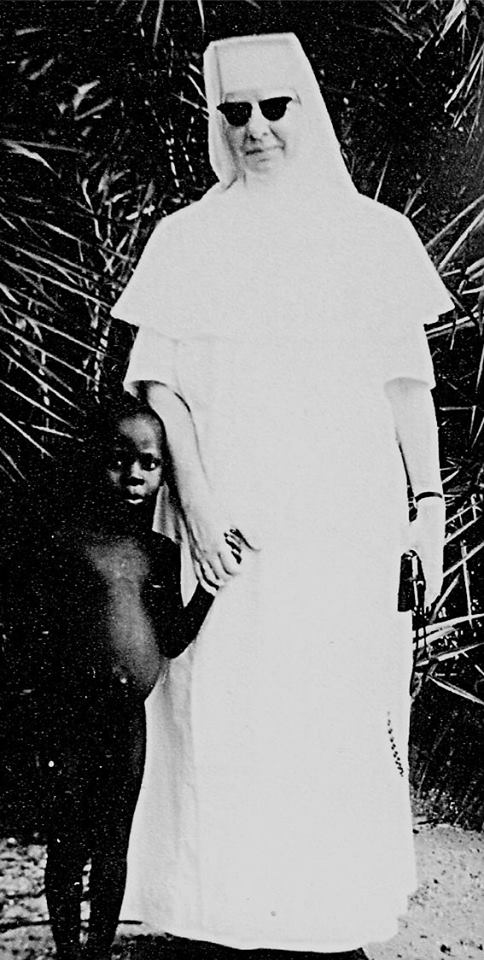About Letters from Nigeria
Here's the Story
In 1956 three Dominican Sisters from Great Bend, Kansas, went to Northern Nigeria to help Dominican Fathers set up a medical clinic in the predominantly Muslim town of Gusau. More of the Great Bend Sisters followed to work as nurses, teachers, and midwives.
My aunt, Sr. Cornelia Bock, was one of the first midwives to go to Nigeria. Before she died a few years ago, Cornelia asked if I would be interested in reading a book of the Sisters’ letters home that she had compiled. The letters were written from 1956 to 1999—over fifty years!
In addition to being highly entertaining, the nearly 500 pages of correspondence are a time capsule of Nigeria and of the world. They also provide an inside view of religious life in the mid-20th century.
Most of my aunt’s fellow Sisters grew up on Kansas farms and joined the order in their mid-teens. Through their letters we follow these ordinary farm girls (many had never gone beyond Wichita) to Nigeria where they lived extraordinary lives showing courage, humor, and grace.
I want people to meet these remarkable women, so I created an audio drama podcast based on the letters that Cornelia took five years of her life to compile.
Chris Robinson
Writer and Producer
Letters from Nigeria

Excerpts from the Sisters' Letters
May 12, 1975 One of the priests who goes out to the villages told us an interesting story. He said he was trying to instruct an old woman in the faith. After several attempts in teaching her to make the sign of the cross, he said, “All right, you try to make it.” She made the sign and said these words, “In the name of the Father, and of the Son, and of the mother, and of the Holy Spirit. Amen.” The priest told her that it was all right except she should leave out “the mother.” The woman looked at him and said, “Maybe since you’re a priest you don’t know but where there’s a son, there’s a mother.” The priest said no more attempts were made to change her sign of the cross and the woman is now baptized.
July 8, 1957 Before you can appreciate this one, let me explain that [Father] is a very jovial priest. One day [he] was in one of the canteens here in Gusau. A woman trader from Sokoto was there also trying to tell her friend that they have very good chickens in Sokoto. For proof she said to her friend, “Just look at the Rev. Father!”
February 11, 1958 One of the reasons we were anxious to start [bush medicine] is to get to the Hausa or Moslem women to begin to come to the maternity for deliveries. It is the custom among the Moslems to keep their women in “purdah,” which means that they are neither allowed to leave their compound nor to been seen by [a man other] than their husband. We see some of these women now when we go to the villages. The husband will come and ask us to come to his compound to see his sick wife or child
April 6, 1962 We heard the doctor shouting near the laundry. Curiosity pulled us out and there we saw the black cobra he had killed. These are the spitting kind; they raise their heads several feet and swell their necks very large and then spit at their attacker. Doctor proved a big hunter that night for in the morning we found the bodies of three cobras. Two of these were about five feet long and the third was over six feet in length.
February 18, 1959 The yearly statistical report on the medical work during the past year shows some interesting facts. Over 24,000 patients received treatment from our sisters.
January 15, 1957 We must tell you a rather gruesome story. We only learned of it, but it happened about a month after we were here. A man was stopped by the police at the railway station. (l think the police needed the money; they do that). He was waiting for the train, so the police asked him what he had in his suitcase. The man answered, “Smoked fish.” He was told to open the suitcase. He did have something smoked in it, but it was the arms and legs of children. There is still cannibalism in some parts. He was taking them east to sell in the markets. Human flesh can still be bought in the markets in the East. Many children just disappear. It seems so impossible.
January 29, 1960 There is much suffering here. Some patients had lost a leg or foot from gun-shot wounds. Many children suffer from malnutrition with huge abdomens and many sores like what we see in textbooks.